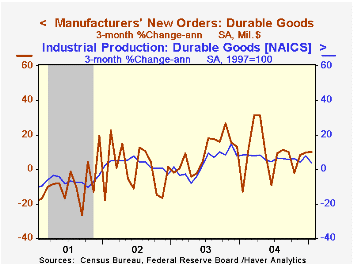 Global| Feb 24 2005
Global| Feb 24 2005U.S. Durable Goods Orders Lower in January, Trend Strong
by:Tom Moeller
|in:Economy in Brief
Summary
Durable goods orders fell 0.9% in January following an upwardly revised gain in December of 1.4%. Consensus expectations had been for no change. Orders for transportation equipment weakened during the last two months, down 5.3% in [...]

Durable goods orders fell 0.9% in January following an upwardly revised gain in December of 1.4%. Consensus expectations had been for no change.
Orders for transportation equipment weakened during the last two months, down 5.3% in January and 2.2% in December due to huge declines in commercial and defense aircraft orders. Less transportation, durable goods orders rose 0.8% (13.2% y/y) last month following an upwardly revised 2.8% December increase.
Nondefense capital goods orders rose 0.2% but less aircraft orders rose 2.9% after an upwardly revised 3.3% December spurt.
Orders for computers & electronic products fell 1.2% (+11.1% y/y) following the upwardly revised 8.3% surge in December. Electrical equipment orders jumped 13.1% (14.6% y/y) and machinery orders rose 0.3% (18.3% y/y). Primary metals orders logged a third consecutive month of strength with a 1.6% rise (27.2% y/y) and orders for fabricated metals rose 1.2% as well (+7.6% y/y).
Inventories of durable goods jumped 0.9% (8.6% y/y). Combined with a 1.5% (12.4% y/y) surge in shipments, which followed a 2.8% December jump, the I/S ratio fell to the lowest level since last May.
Unfilled orders slipped 0.2%, the first monthly decline in a year (+8.9% y/y). As shipments surged during the last two months, the ratio of backlogs to shipments reversed nearly all of last year's gains.
| NAICS Classification | Jan | Dec | Y/Y | 2004 | 2003 | 2002 |
|---|---|---|---|---|---|---|
| Durable Goods Orders | -0.9% | 1.4% | 11.6% | 10.8% | 2.6% | -1.7% |
| Nondefense Capital Goods | 0.2% | -0.7% | 18.8% | 13.7% | 5.6% | -7.2% |
| Excluding Aircraft | 2.9% | 3.3% | 17.0% | 11.7% | 6.6% | -7.1% |
Tom Moeller
AuthorMore in Author Profile »Prior to joining Haver Analytics in 2000, Mr. Moeller worked as the Economist at Chancellor Capital Management from 1985 to 1999. There, he developed comprehensive economic forecasts and interpreted economic data for equity and fixed income portfolio managers. Also at Chancellor, Mr. Moeller worked as an equity analyst and was responsible for researching and rating companies in the economically sensitive automobile and housing industries for investment in Chancellor’s equity portfolio. Prior to joining Chancellor, Mr. Moeller was an Economist at Citibank from 1979 to 1984. He also analyzed pricing behavior in the metals industry for the Council on Wage and Price Stability in Washington, D.C. In 1999, Mr. Moeller received the award for most accurate forecast from the Forecasters' Club of New York. From 1990 to 1992 he was President of the New York Association for Business Economists. Mr. Moeller earned an M.B.A. in Finance from Fordham University, where he graduated in 1987. He holds a Bachelor of Arts in Economics from George Washington University.
More Economy in Brief
 Global| Feb 05 2026
Global| Feb 05 2026Charts of the Week: Balanced Policy, Resilient Data and AI Narratives
by:Andrew Cates






